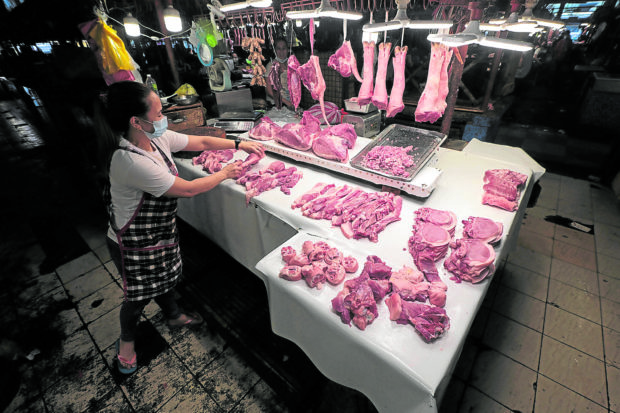Gov’t boosts response to fresh wave of ASF

FRESH MEAT In this photo taken in March last year, workers at the Legazpi City slaughterhouse follow health and sanitation procedures as they butcher hundreds of pigs intended for markets and meat stalls in the city. Hog raisers and meat vendors are slowly recovering from the impact of the African swine fever that hit commercial and backyard farms in the country in 2019 and 2020. —MARKALVIC ESPLANA
The Philippines is facing its third wave of African swine fever (ASF) outbreak with no cure in sight for the highly contagious swine disease, according to the director of the National Meat Inspection Service (NMIS).
Reildrin Morales, the NMIS director, said the best option was an “elevated response” to contain the virulent disease that had battered the meat industry since it was first detected in the Philippines in 2019.
“[We need a] deregulated response [that] will bring the fight down to the local government units and barangays,” Morales said in a phone interview.
Spared
Another is a recent partnership between the Bureau of Animal Industry (BAI) and the University of the Philippines Los Baños (UPLB) for a science-based protocol to contain the spread of the disease.
The ASF infects pigs, warthogs, European wild boars and American wild pigs, with deaths occurring in two to 10 days and a mortality rate going as high as 100 percent, the BAI said. It does not threaten humans, though.
Article continues after this advertisementIn a Jan. 9 dialogue with UPLB, Samuel Castro, the ASF focal person of the Department of Agriculture (DA), said the country had lost 30 percent of its total hog population, with outbreaks traced to 37 provinces.
Article continues after this advertisementThe DA said only a few areas in the Visayas, Mimaropa (Mindoro, Marinduque, Romblon, Palawan), and parts of Mindanao had remained ASF-free, although the DA office in Eastern Visayas reported an outbreak in backyard farms in Abuyog, Leyte province, on Jan. 16.
On-site diagnostics
Morales said global efforts to develop a vaccine had yet to yield a positive result.
The renewed government response brings in village officials to increase surveillance, particularly monitoring the movement of meat traders, and public awareness against swill feeding, he said.
Jezie Acorda, dean of the UPLB College of Veterinary Medicine and head of the technical working group against the ASF, avian influenza and other economically important diseases, said they were preparing a comprehensive program protocol that would include developing “on-site” diagnostics, or test kits for sick pigs.

FEW TAKERS Only a few market goers in Pasig City buy pork as meat prices increase due to dwindling supply from domestic farms.—GRIG C. MONTEGRANDE
“Right now, it takes several days to determine the results using current test kits for the ASF,” Acorda said in an interview on Monday.
The UPLB working group is also keen on drawing up protocols on repopulating swine disease-affected farms or to determine a safe period before bringing in new breeder stocks.
GenSan supply
In General Santos City, consumers and meat vendors are complaining of rising prices of live pigs and pork in the markets as high demand in Luzon has diminished local supply.
Vendors lamented that despite the huge number of pig farms in the city, they could no longer afford to buy live hogs as raisers were selling to buyers from Metro Manila at higher prices.
Toto Mosqueda, a meat retailer, said he and the other vendors were being left out as prices of live swine soared to P175 to P195 a kilo from last year’s P135 a kilo in July and P145 a kilo in November.
Dr. Antonio Marin, chief of the city veterinary office, said the scarce supply of hogs in Luzon brought about by the ASF had sent prices soaring.
He said the country had been facing a shortage of swine and pork, and General Santos, which remains free of the swine disease, had been shipping an average of 4,000 pigs to Luzon every week.
Pork prices in the city have gone up to P280 a kilo for belly, P270 for chops, P270 for shoulder and loins, P240 for ribs and legs, and P170 for soup bones.
The threat of the ASF has prompted city authorities to impose stricter measures at the abattoir, aside from the existing ban on the entry of hogs and pork products from other areas, including the nearby provinces of Sarangani and South Cotabato.
Last year, the hog industry in General Santos was pegged at P8.4 billion, the third largest in the country with a swine population estimated at 457,000, of which 420,000 are in large-scale commercial hog farms and the rest in backyard farms. —WITH A REPORT FROM ROMMEL REBOLLIDO INQ